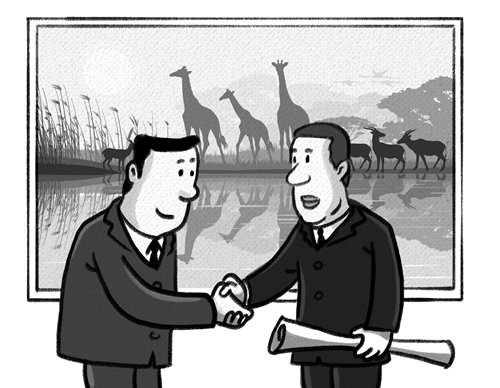HOME >> BUSINESS
China-Africa governance exchange nothing like the export of Western institutions
By Song Wei Source:Global Times Published: 2019/9/29 20:13:39

Illustration: Liu Rui/GT
Since the founding of the People's Republic of China, China has been providing foreign aid for 70 years. It can be said that foreign aid was the most important and even the only content of the Republic's diplomacy for a long time. As China's aid expands, especially with the deepening of China-Africa relations in recent years, the criticism of China's aid to Africa by world opinion has intensified.
Although "encouraging corruption" and "exporting the Chinese model" is not the reality of China's aid to Africa, the relationship between China's foreign assistance and the buildup of Africa's governance capacity still needs clarification.
China never avoided talking about the emphasis of aid or downplayed the governance exchanges between China and African countries. China's foreign aid model is fundamentally different from the adopted Western model.
The Western aid model is accompanied by lots of add-on conditions like political system reform, market economy reform and government performance. Once African countries do not meet the bar, Western countries will wield punishing sticks.
In contrast, China has guaranteed that its aid to Africa "does not attach any conditions and does not interfere with Africa's domestic affairs." This model should not be interpreted as China's aid does not support the improvement of African countries' governance or exacerbates corruption in Africa.
The evolution of China's foreign aid in the past 70 years is an important part of China's continuous efforts to be integrated into and shape globalization.
China's aid to Africa accounts for more than one third of China's total foreign aid, which epitomizes China's understanding of South-South cooperation and global development governance.
China supports Africa's governance improvement. Its foreign aid has gradually refined and sublimated from strengthening infrastructure construction, emphasizing technical cooperation and official training, to highlighting the exchange of experience in governing the country.
China's aid to Africa also covers four major aspects, including security and the rule of law, participation of citizens in governance and human rights, opportunities for sustainable economic development, and human development.
There are three reasons as to how Chinese experience and practice in strengthening Africa's governance capacity have also been positively evaluated by African countries and the global development evaluation system.
First, China's development experience better suits Africa. Developed countries have long wished to apply their development theories to Africa. However, Africa, as a former colony, is not equipped with the same starting point and conditions as developed countries. Forcing the model on this theme has caused turmoil and even infiltration of terrorism in Africa. In contrast, with more resemblances, China can be a better reference for African countries.
Second, China's aid pays more attention to equal status in China-Africa relations. China treats African countries based on the principles of respect and equality.
This is of great attraction to the African continent that was once colonized and accustomed to the double standards of the West.
Third, China's aid has enhanced the bargaining power of African countries. For example, Angola ended 27 years of civil war in 2002. Western society led by the US attached many additional conditions to Angola's post-war reconstruction assistance, which prevented Angola from obtaining start-up funds. However, China insisted on providing unconditional aid to Angola, which enabled Angola to claim rights in negotiations with the West and eventually compelled the West to make concessions.
However, China is also facing the problem like how to get a better result from aid in promoting African governance. Since conducting the governance exchanges with China depends on African countries' free will, the lack of government transparency mechanisms in African countries has exacerbated the problem.
If the exchange of governance experience only stays in the words and documents and lacks supervision and evaluation, the effect of improving the governance capacity of African countries will certainly be greatly reduced.
Improving governance capacity is crucial to Africa's independent development. For an entire century, Africa failed to rid itself of the development dilemma and achieve poverty alleviation under Western guidance.
Therefore, African countries hold high expectations for China, a fast-growing emerging power. They hope to learn distinctive experience from their new partner, which is why Africa is "looking east."
China is willing to share its development and governance experience accumulated in the past decades with African countries, thus boosting African modernization. Although the actual implementation is also faced with some difficulties, I believe that with the continuous enhancement of political mutual trust between China and Africa, the external impetus will certainly be internalized into the endogenous impetus for reform.
The author is an associate research fellow at the Chinese Academy of International Trade and Economic Cooperation under the Ministry of Commerce. bizopinion@globaltimes.com.cn
Posted in: EXPERT ASSESSMENT